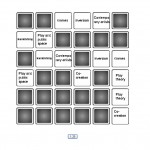As part of my preparation for Tricking the Everyday I managed to get part of…
Artist2.0
Posted by Everdien on 6/11/11 • Categorized as All posts
 I’ve become much attached to weblog writing – my external memory is growing in size every day. Visual Art Research has proven to be very useful to me, and in more ways than one, too. I can find names that have escaped me, show my work to people, organise my ideas, clear my mind. I also connect to people from all over.
I’ve become much attached to weblog writing – my external memory is growing in size every day. Visual Art Research has proven to be very useful to me, and in more ways than one, too. I can find names that have escaped me, show my work to people, organise my ideas, clear my mind. I also connect to people from all over.
Being part of the Internet community was not my goal when starting up this blog. It more or less happened on the way. Becoming conscious of people looking over my shoulder was not entirely a good thing, even though I love getting comments. When I started to check my visitor stats at Google Analytics a lot I knew I was in trouble. Thinking this intuition through, I realised that writing for an audience took away an element that is essential to me: the freedom to ramble and wander, to speculate and just jot down things. To do just plain bad writing and not worry about my language skills. This led to the decision to keep myself to myself and not play for the audience anymore. A relief!
I do allow the world to access my external memory, thoug, and never came back on this decision. I try to be an artist2.0 – it seems so outdated to look for purely personal creativity in times of cloud computing and crowd sourcing. We’re experiencing the joys and evils of the network society – we’ve only just started and we Aint Seen Nothing Yet.
Counter-intuitive example of the effects of the ‘net, taken from Trouw, Sebastiaan van der Lubben, saturday June 11th 2011, my translation:
“2. Stultifying: The popularity of online games, video’s and music is many times greater than that of political blogs, even amongst the oppressed. It is not religion, writes Evgeny Morozov in his pamphlet ”The Net Delusion – How Not To Liberate The World”, but the media that are opium to the people. …… . In the former DDR, people that had access to western media were less critical towards the regime than fellow countrymen that were doomed by geography to live in the Valley of Ignorance. This Valley being a declivity in the countryside around Dresden where West German TV signals did not penetrate. Those living in the Valley were destined to watch communist propaganda evening after evening. This being so, they had more complaints about the system than the people with access to western TV. The propaganda did not get to hem. Stated in another way: that propaganda got more and more irritating. Information from the ‘free world’ did not motivate DDR citizens to revolt, but proved to be an escape from daily life in the working man’s paradise.”
Gerelateerd:
-
External memory taking over
-
Memory
Working with masses of pics like I blogged about yesterday made me think of playing…
| « Being part of an artwork | <-- previous post | next post --> | Ingrid Edwards olfactory art » |
|---|








